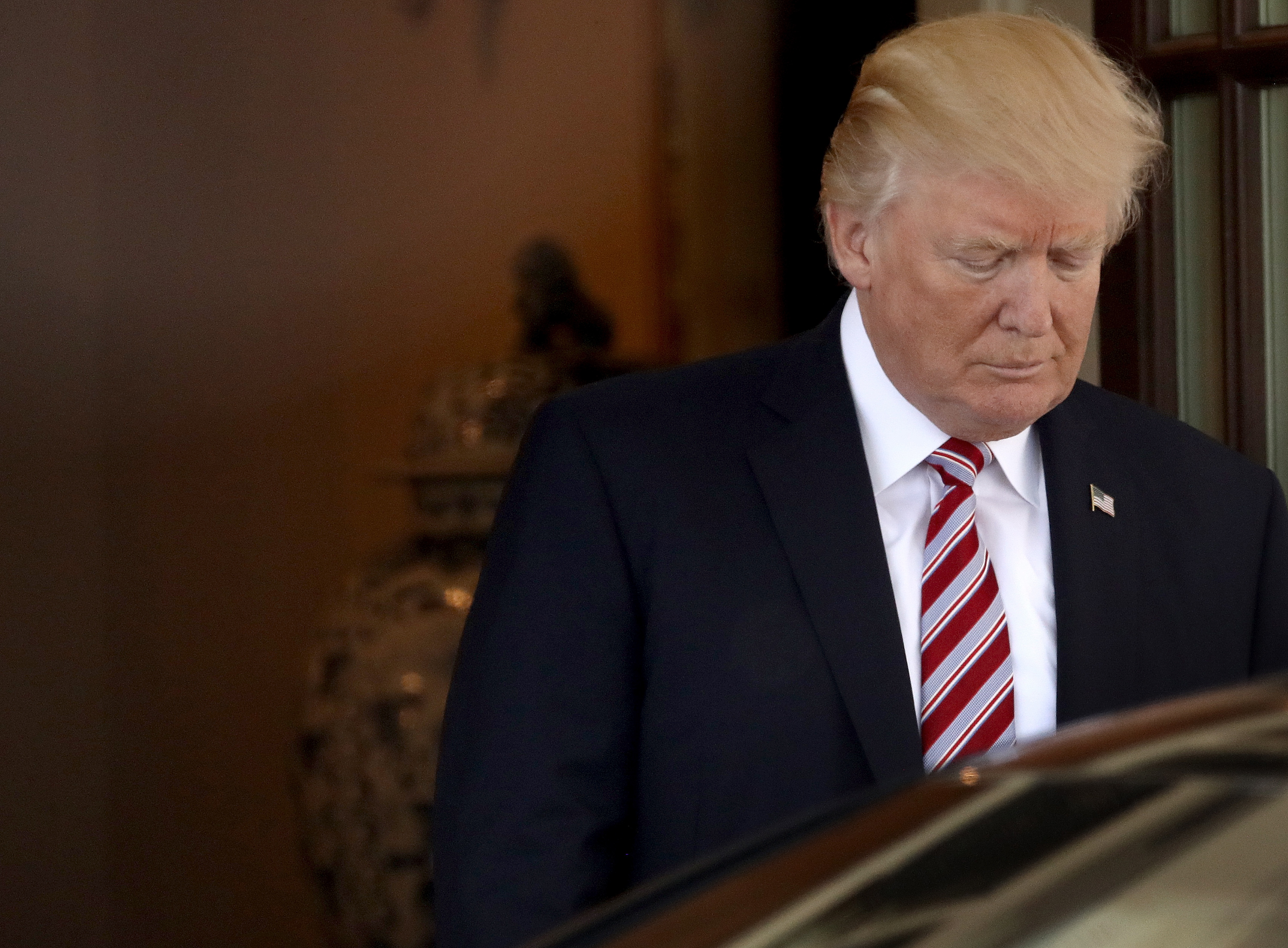Why a special prosecutor is such bad news for Trump
Mueller won't answer to the president, and that's good for everyone


A free daily email with the biggest news stories of the day – and the best features from TheWeek.com
You are now subscribed
Your newsletter sign-up was successful
Consuming the news this week has been an exhausting ordeal. Every moment of the past seven days has been spent in irresolvable tension: I should put my phone away because looking at the internet this much will alienate my family and drive me insane, but I can't put my phone away because I might miss the latest gobsmacking developments in the accelerating disintegration of the Trump White House.
This firehose-to-the-lips torrent of news kept right on gushing yesterday with word that the Justice Department had selected a special counsel, former FBI Director Robert Mueller, to take over the department's investigation into Russian interference in the 2016 election and whatever ties exist between Russia and Donald Trump's presidential campaign. Mueller was selected by Deputy Attorney General Rod Rosenstein (serving as acting attorney general because of Jeff Sessions' recusal from the matter), who was under pressure to outsource management of the investigation following President Trump's abrupt firing of FBI Director James Comey.
Putting Mueller in charge of the Russia investigation is a big deal, and it is definitely bad news for Donald Trump.
The Week
Escape your echo chamber. Get the facts behind the news, plus analysis from multiple perspectives.

Sign up for The Week's Free Newsletters
From our morning news briefing to a weekly Good News Newsletter, get the best of The Week delivered directly to your inbox.
From our morning news briefing to a weekly Good News Newsletter, get the best of The Week delivered directly to your inbox.
Ever since becoming president, Trump has consistently voiced his frustration with the Russia investigation and made it unmistakably clear that he wants to control the inquiry or make it go away. When Sessions (one of Trump's staunchest allies) recused himself from the Russia inquiry, Trump was furious. He tried to pressure Comey to lay off his investigation into disgraced former Trump National Security Adviser Michael Flynn, and then he fired Comey because of "this Russia thing." One of the big concerns following Comey's dismissal was that Trump would nominate a successor who would espouse personal loyalty to the president and deprioritize the investigation.
Mueller, however, isn't someone Trump will have direct influence over. As special counsel, Mueller won't answer to Trump. He'll answer to Rosenstein, which means Trump can't get rid of Mueller like he did Comey (unless he were to go Full Nixon and order Rosenstein to fire him). And Mueller has already demonstrated that he's willing to defy a president — during the George W. Bush administration, he and James Comey raced to the hospital room of then-attorney general John Ashcroft to prevent two top Bush aides from pressuring the convalescing Ashcroft into reauthorizing the president's domestic surveillance program.
The Russia investigation will now proceed with a greater degree of independence from the executive branch, which is absolutely necessary given how dysfunctional and dishonest the White House is. Rosenstein's letter laying out Mueller's authority over the Russia inquiry also states that he is "authorized to prosecute federal crimes arising from the investigation of these matters." That means Trump's and the White House's meddling in the Russia investigation (which might rise to the level of obstruction of justice) could also come under the special counsel's scrutiny.
For Trump's Republican enablers in Congress, Mueller's appointment offers a mild (and temporary) political reprieve. Trump's erratic and dishonest attempts to interfere with the law enforcement investigation into his campaign were creating an increasingly dire political crisis for congressional Republicans who would be forced to choose between keeping their legislative agenda alive or defending Trump's dangerous behavior. Now they can use the special counsel appointment to deflect questions about the White House's dissembling and express confidence that the investigation will proceed without any political interference.
A free daily email with the biggest news stories of the day – and the best features from TheWeek.com
But the Trump scandal news is developing far too quickly for Republicans to expect any sort of long-term political stabilization from the Mueller appointment. In keeping with this week's pattern of rapid-fire bombshells, the Mueller news was followed up almost immediately by The New York Times' exclusive that Trump transition officials were aware Michael Flynn was under federal investigation for his foreign lobbying activities before Trump made him national security adviser. James Comey has also been asked by both Senate and House committees to testify in public about reports that Trump pressured him to end the FBI investigation into Flynn.
There are scandals and outrages as far as the eye can see. Robert Mueller has his work cut out for him, and the rest of us will just have to try to keep up.
Simon Maloy is a political writer and researcher in Washington, DC. His work has been published by The Huffington Post, The American Prospect, and Salon.
-
 Minnesota's legal system buckles under Trump's ICE surge
Minnesota's legal system buckles under Trump's ICE surgeIN THE SPOTLIGHT Mass arrests and chaotic administration have pushed Twin Cities courts to the brink as lawyers and judges alike struggle to keep pace with ICE’s activity
-
 Big-time money squabbles: the conflict over California’s proposed billionaire tax
Big-time money squabbles: the conflict over California’s proposed billionaire taxTalking Points Californians worth more than $1.1 billion would pay a one-time 5% tax
-
 ‘The West needs people’
‘The West needs people’Instant Opinion Opinion, comment and editorials of the day
-
 The billionaires’ wealth tax: a catastrophe for California?
The billionaires’ wealth tax: a catastrophe for California?Talking Point Peter Thiel and Larry Page preparing to change state residency
-
 Bari Weiss’ ‘60 Minutes’ scandal is about more than one report
Bari Weiss’ ‘60 Minutes’ scandal is about more than one reportIN THE SPOTLIGHT By blocking an approved segment on a controversial prison holding US deportees in El Salvador, the editor-in-chief of CBS News has become the main story
-
 Has Zohran Mamdani shown the Democrats how to win again?
Has Zohran Mamdani shown the Democrats how to win again?Today’s Big Question New York City mayoral election touted as victory for left-wing populists but moderate centrist wins elsewhere present more complex path for Democratic Party
-
 Millions turn out for anti-Trump ‘No Kings’ rallies
Millions turn out for anti-Trump ‘No Kings’ ralliesSpeed Read An estimated 7 million people participated, 2 million more than at the first ‘No Kings’ protest in June
-
 Ghislaine Maxwell: angling for a Trump pardon
Ghislaine Maxwell: angling for a Trump pardonTalking Point Convicted sex trafficker's testimony could shed new light on president's links to Jeffrey Epstein
-
 The last words and final moments of 40 presidents
The last words and final moments of 40 presidentsThe Explainer Some are eloquent quotes worthy of the holders of the highest office in the nation, and others... aren't
-
 The JFK files: the truth at last?
The JFK files: the truth at last?In The Spotlight More than 64,000 previously classified documents relating the 1963 assassination of John F. Kennedy have been released by the Trump administration
-
 'Seriously, not literally': how should the world take Donald Trump?
'Seriously, not literally': how should the world take Donald Trump?Today's big question White House rhetoric and reality look likely to become increasingly blurred
